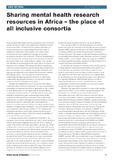| dc.contributor.author | Ndetei David M. | |
| dc.date.accessioned | 2013-04-29T08:21:22Z | |
| dc.date.available | 2013-04-29T08:21:22Z | |
| dc.date.issued | 2008-02 | |
| dc.identifier.citation | Afr J Psychiatry (Johannesbg). 2008 Feb;11(1):1-3. | en |
| dc.identifier.uri | http://www.ncbi.nlm.nih.gov/pubmed/19582319 | |
| dc.identifier.uri | http://erepository.uonbi.ac.ke:8080/xmlui/handle/123456789/17492 | |
| dc.description.abstract | It is now generally evident that the prevalence rates of various mental disorders in Africa are similar if not identical to those found in the West. Poverty and the relative deficiency of
human resources are compounding factors that make it unlikely for replication of psychiatric and mental health services in the same quality and quantity as currently
provided in resource-rich countries.This not withstanding, it is not necessary for such services to be imported wholesale into the peculiar socio-cultural Africa context, orfor quality and quantity to be measured in the same way as is done in the resource-rich countries.This means that Africa must find its own home-grown evidence-based policies and practices that allow for service to be available, accessible, affordable and
appropriate within the socio-cultural and economic contexts prevailing in Africa.This can only be achieved through contextually designed operationalresearch to determine
contextually appropriate solutions to the myriad of mental health issues and challenges facing Africa. | en |
| dc.language.iso | en | en |
| dc.title | Sharing mental health research resources in Africa - the place of all inclusive consortia | en |
| dc.type | Article | en |


